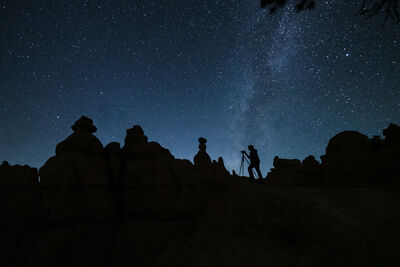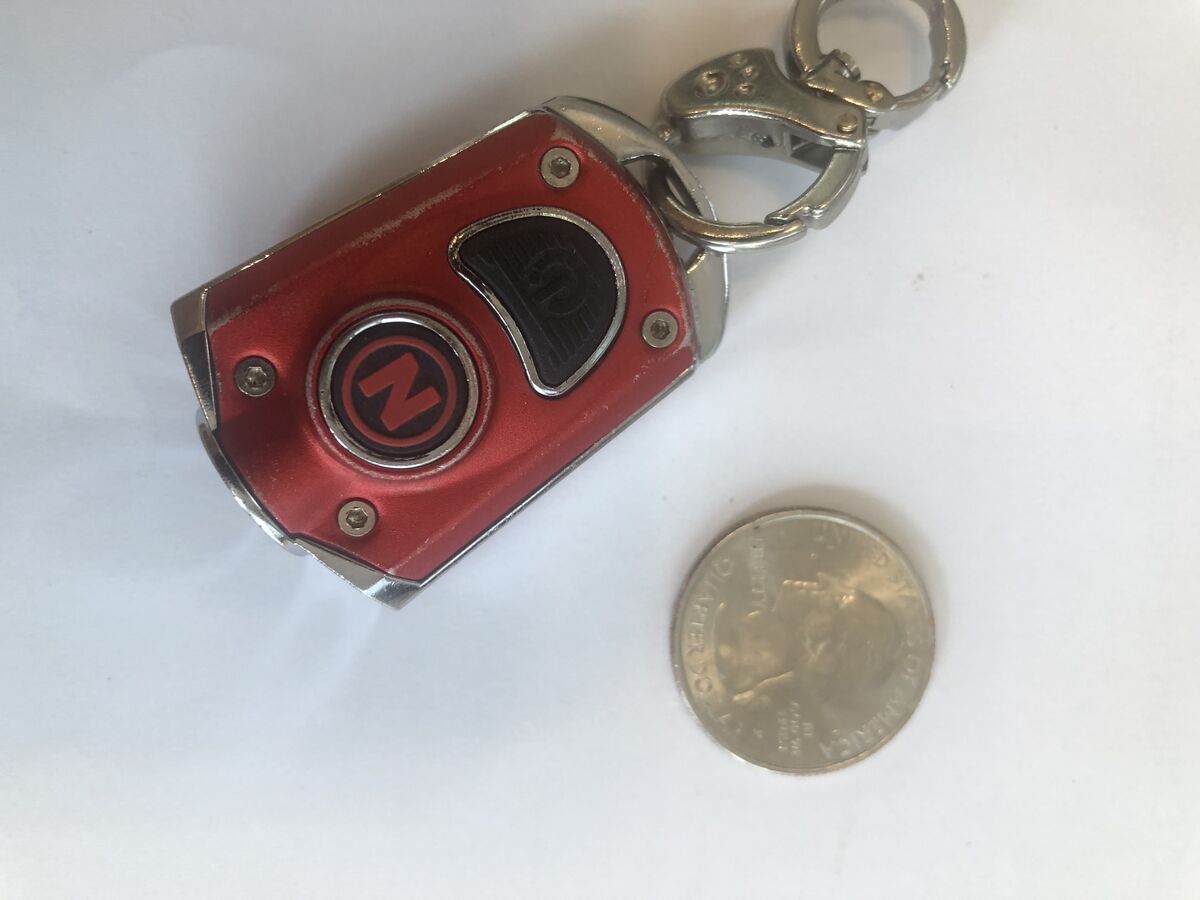Red or green flashlight for night photography
Mar 28, 2023 12:08:31 #
Red is the accepted color of choice. Since I am also a Pilot I get my red-white flashlights from places like Sporty's Pilot shop....https://www.sportys.com/shop.html?q=flashlights . you can also check Telescope shops..
Mar 28, 2023 12:13:00 #
Kevin.M wrote:
I’m going to be going out at night and have read that red or green light is better for your eyes than a white light.
Does anyone have experience with using a red or green light when doing night photography and is it worth investing in colored light for this?
~Kevin
Does anyone have experience with using a red or green light when doing night photography and is it worth investing in colored light for this?
~Kevin
Thank you everyone for all the replies, lots of great, informative information!
Mar 28, 2023 12:13:39 #
Juy
Loc: Delaware
I have found using a green head lamp as I walk to my Deer hunt location, gives me a very good view of the immediate surrounding area, and does not shut my pupils down so much. Red works very well also but give a more limited area view to only what is directly in the beam. Both work very well for seeing camera and equipment for set up, and once turned off your night vision comes back very quickly.
Mar 28, 2023 12:29:57 #
Kevin.M wrote:
I’m going to be going out at night….
~Kevin
~Kevin
I prefer the Red light mode. I have a few of these lights.
This is a NEBO…MYCRO.
It is small enough to fit in keys and inside a bag attached to a zipper. It has 3 white light modes plus a green LED and a red LED.
I’m not particularly fond of flashlights that are larger than your palm. But this does charge from a USB port.
Mar 28, 2023 19:34:06 #
mikegreenwald wrote:
I'm no expert on this subject, but I've seen two different studies that claimed to show that the intensity of the light is what counts most, not the wave length (red, etc). It was a long while ago, and I can neither remember where they were, nor can I find them with a Google search.
That is correct. At the same light intensity, red is better because it has least impact on the rods in your eyes. However, if you are trying to see details, then there is the tendency to use higher intensity red, and that impacts night vision. Green is better for details, and that is why green is used in night vision goggles.
So the answer is that red is best as long as the intensity is low, but if you need to see details, then using a higher intensity red versus a lower intensity green is not good.
Mar 28, 2023 19:43:56 #
Mar 28, 2023 19:51:33 #
ORpilot wrote:
Red is the accepted color of choice. Since I am also a Pilot I get my red-white flashlights from places like Sporty's Pilot shop...
I’m not a pilot yet. I still have a brazillion hours before I get my rating if I ever do. But I like Sporty’s. They have a lot of great gear.
Mar 28, 2023 23:05:34 #
ORpilot wrote:
Wow, didn't realize they were still around. Lived in Cincy area, bought some stuff from them when I was flying Cessnas in the 1970s...places like Sporty's Pilot shop...
Mar 29, 2023 09:12:42 #
Kevin.M wrote:
I’m going to be going out at night and have read that red or green light is better for your eyes than a white light.
Does anyone have experience with using a red or green light when doing night photography and is it worth investing in colored light for this?
~Kevin
Does anyone have experience with using a red or green light when doing night photography and is it worth investing in colored light for this?
~Kevin
Red was the color used for many decades on Navy and commercial ships around the world for decades…but back in the 80s it was switched to blue because that also doesn’t affect night vision and one can see instruments and such better in blue than red. That said…rig for black was the common thing with all lights off except for instruments and most of those were red with the brightness turned down because while changing area lighting o blue was easy instrument lights are internal and not changeable.
Mar 29, 2023 11:30:29 #
larryepage
Loc: North Texas area
You have received a lot of conflicting answers here. Some have a glimmer of truth. Some are based on limitations of early technology. Most have nothing to do with your question concerning night photography. For instance...night vision scopes had green displays because the early versions used an excited phosphor display. The phosphor used glowed green when excited. Same reason almost every early oscilloscope had a green CRT display.
One reason for concern with night displays is keeping the bad guy from seeing you. Any monochromatic color is helpful with this. Since a surprisingly high percentage of the population is red/green color blind, either of those colors can work at low intensities Green can be pretty good outside in green foliage. Blue is actually a poor choice, because many people cannot see very well in blue light that is close to monochromatic and is really blue. Compensation via increasing the intensity by a lot is frequently required.
A second concern around night vision is not messing up the vision of the other folks on your own team. For night photography, keeping the peace will require you to have a red light. No one is going to care about a discussion of green or blue as an alternative. A red light will avoid banishment to the wilderness.
Finally, you want to preserve your own vision. Biologically, the color you want is red. Red is the only color that will avoid chemically killing your night vision for 15-20 minutes. Ideally, you are going to be working in an environment of total darkness (or as close to it that the difference doesn't matter). And you will find that there is a big difference between this kind of darkness and the more commonly experienced darkness. (As we learned in The Princess Bride, there is a big difference between mostly dark and all dark.)
So...red is the color.
One reason for concern with night displays is keeping the bad guy from seeing you. Any monochromatic color is helpful with this. Since a surprisingly high percentage of the population is red/green color blind, either of those colors can work at low intensities Green can be pretty good outside in green foliage. Blue is actually a poor choice, because many people cannot see very well in blue light that is close to monochromatic and is really blue. Compensation via increasing the intensity by a lot is frequently required.
A second concern around night vision is not messing up the vision of the other folks on your own team. For night photography, keeping the peace will require you to have a red light. No one is going to care about a discussion of green or blue as an alternative. A red light will avoid banishment to the wilderness.
Finally, you want to preserve your own vision. Biologically, the color you want is red. Red is the only color that will avoid chemically killing your night vision for 15-20 minutes. Ideally, you are going to be working in an environment of total darkness (or as close to it that the difference doesn't matter). And you will find that there is a big difference between this kind of darkness and the more commonly experienced darkness. (As we learned in The Princess Bride, there is a big difference between mostly dark and all dark.)
So...red is the color.
Mar 29, 2023 16:52:05 #
Kevin.M wrote:
I’m going to be going out at night and have read that red or green light is better for your eyes than a white light.
Does anyone have experience with using a red or green light when doing night photography and is it worth investing in colored light for this?
~Kevin
Does anyone have experience with using a red or green light when doing night photography and is it worth investing in colored light for this?
~Kevin
My Pentax K-70 has a night light for the display that is red.
Mar 30, 2023 09:29:57 #
PhotogHobbyist wrote:
My Pentax K-70 has a night light for the display that is red.

Mar 30, 2023 09:30:13 #
Mar 30, 2023 09:30:49 #
Mar 31, 2023 10:22:57 #
I have a good one but it is mounted on my #$%@! (can't say the model as it my be non PC)
If you want to reply, then register here. Registration is free and your account is created instantly, so you can post right away.






